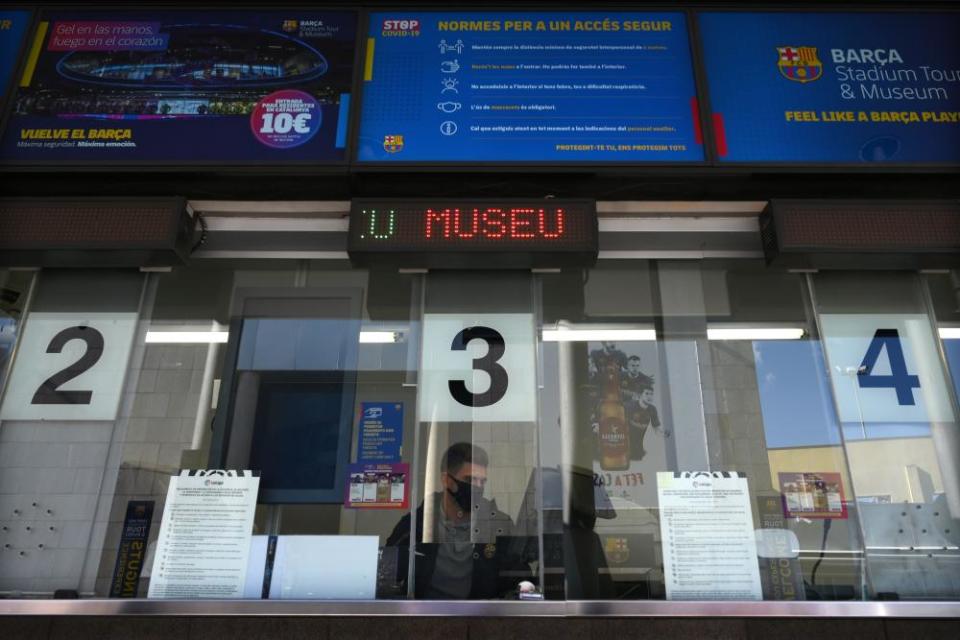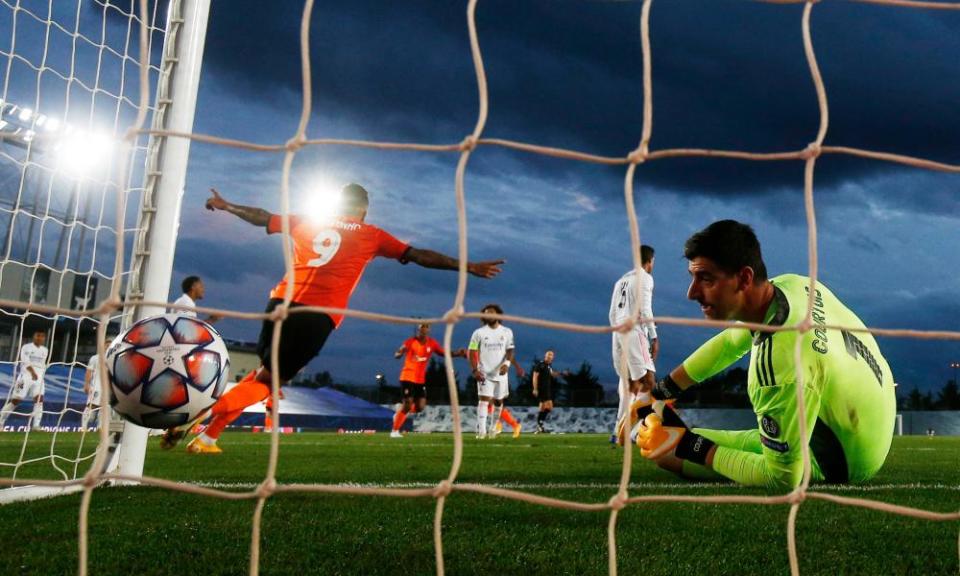Barcelona v Madrid: a silent clásico for teams with little to shout about
Even after 118 years, 244 competitive games, 96 wins each, and 804 goals, there’s still room for something new, something different. Since Madrid CF and FC Barcelona first faced each other at the capital’s hippodrome in May 1902, tetanus jabs administered before taking the field, there have been police on the pitch, military in the dressing room and bottles in the air; streakers, protesters chained to posts, political demands and postponements; car bombs, poked eyes, broken legs and flying pigs. There have been fights too, and the finest football on the planet. What there still hasn’t been is a clásico played behind closed doors.
Until now.
Related: 'How can it be?': Piqué tears into Barcelona over Messi situation
The first time Madrid and Barcelona met, they borrowed a load of chairs from a trader at the Rastro market for supporters to sit on. On Saturday afternoon there will be 98,000 seats available but no one to take them. Around the world, millions will watch; inside the Camp Nou, a little more than 240 people will see the game in the flesh – and that includes the players. Yes, everyone knows that, seven months after the pandemic brought a stop to sport and to life, but this game particular brings that home again. The biggest match of all is set to be silenced.
It’s not supposed to be this way but there may be a sense that, this time, it’s not so out of line with the way they are. Neither Madrid nor Barcelona have all that much to shout about at the moment. So much so that both may feel that the damage of defeat is greater than the reward of victory, fearing this fixture and seeing it as something just to get through quietly and live to fight another day. If Madrid are defeated heavily and, absurd though it sounds, Zinedine Zidane will wonder whether he will be denied even that.
After a decade of dominance – seven of 10 Champions Leagues until 2018 – there is a feeling that something has slipped at Spain’s big two. In the first meeting last season, played at the Camp Nou a month later than scheduled because of unrest in Catalonia, Barcelona and Madrid drew 0-0. That was the first time in 47 matches no one had scored. This was the match with an unerring ability to match its billing. It is unclear what that billing is on Saturday, but it’s not what it was.
Put simply, it’s not that certain that these teams are particularly good yet. A week ago, the Catalan sports daily El Mundo Deportivo opened with: “Double KO”. Madrid and Barcelona had been beaten the night before against Cádiz and Getafe respectively and neither had even scored. Three days later, after Madrid had been beaten 3-2 by a Shakhtar Donetsk side that had 13 players missing, Marca’s headline ran on “Worse by the day”. Barcelona, by contrast, had beaten Ferencvaros 5-1 but while El Mundo Deportivo called it “five goals to believe” that was because they had needed something.

These are times of uncertainty and austerity, neither club making huge reinforcements in the summer, reflected in a market in which Spanish clubs spent €1bn less than their Premier League counterparts. And that after a season in which neither truly made an impact on the Champions League: Madrid were eliminated at the first knockout round for the second year running; Barcelona conceded eight to Bayern Munich, to go with the four in Liverpool the year before. Put bluntly, neither looks that good now, although time may remedy that.
These are ageing teams, it can feel like. Sergio Ramos and Gerard Piqué, Sergio Busquets and Luka Modric, Lionel Messi and Karim Benzema are over 30. There is young talent coming through and it is exciting: Vinícius at Madrid, Martin Ødegaard as well, and particularly Ansu Fati at Barcelona with glimpses of real quality from Pedri and Trincão – but it is early still to be sure, or to make demands. There are injuries – right-back Dani Carvajal out for Madrid, left-back Jordi Alba out for Barcelona. And their most expensive signings, bought a year ago for a combined cost over €250m, may not start.
Eden Hazard, scorer of a solitary league goal in a year at Madrid, is injured again. That is 35 games he has missed in Spain, compared with eight at Chelsea. Antoine Griezmann is still seeking a role, and may well be a substitute. Perhaps it’s a challenge thrown down, an attempt to provoke a reaction, but Ronald Koeman’s patience appears to be wearing thin. He gave short shrift to the Frenchman’s comment that “Deschamps knows where to play me”, bluntly pointing out the opportunities missed and reminding him that the manager is the boss. In midweek Griezmann was left out: a prelude to playing or a demonstration of disposability?
Koeman is trying to construct a 4-2-3-1, a sometimes narrow formation which doesn’t always appear a natural fit to his footballers. The most important of them, emotionally, tactically, and politically is Messi. Coaxed and comforted after the exit door was closed on him and in a context in which his estrangement from the club’s board is painfully public, he is yet to score from open play. There’s little sign of him being convinced to stay beyond this season, that doubt dangling over all of them, much as the endless institutional crisis does. “There’s always something here,” Koeman says.

As for Madrid, it would not be a huge surprise if Zidane’s latest formation is four in midfield, seeking some protection. They conceded more goals in 16 minutes against Shakhtar than in the whole of last year’s post-lockdown period in the league. Although not the most sparkling of league champions, they had a solidity and the ability to find a goal from somewhere: a dead ball, a moment’s inspiration, a penalty. Now, that appears to have deserted them.
Even before the Cádiz defeat, there were worrying signs – when your best player is your keeper it’s rarely a good thing – and that afternoon they produced a half of football as bad as most could remember. Grateful that they only trailed by one goal and not five, Zidane made four changes at half-time. Afterwards Casemiro declared their attitude unacceptable. Three days later, they produced a half even worse, a storm gathering. “It’s grey today but tomorrow the sun will come out again,” Zidane said, and he confirmed on Friday Ramos will be available. “I’m capable of fixing this and that’s what I’m going to do.”
“We haven’t forgotten how to play football,” Modric said. “And it’s good news that the next game is the clásico, which is always different.” It certainly will be this time.

 Yahoo Sport
Yahoo Sport 





































